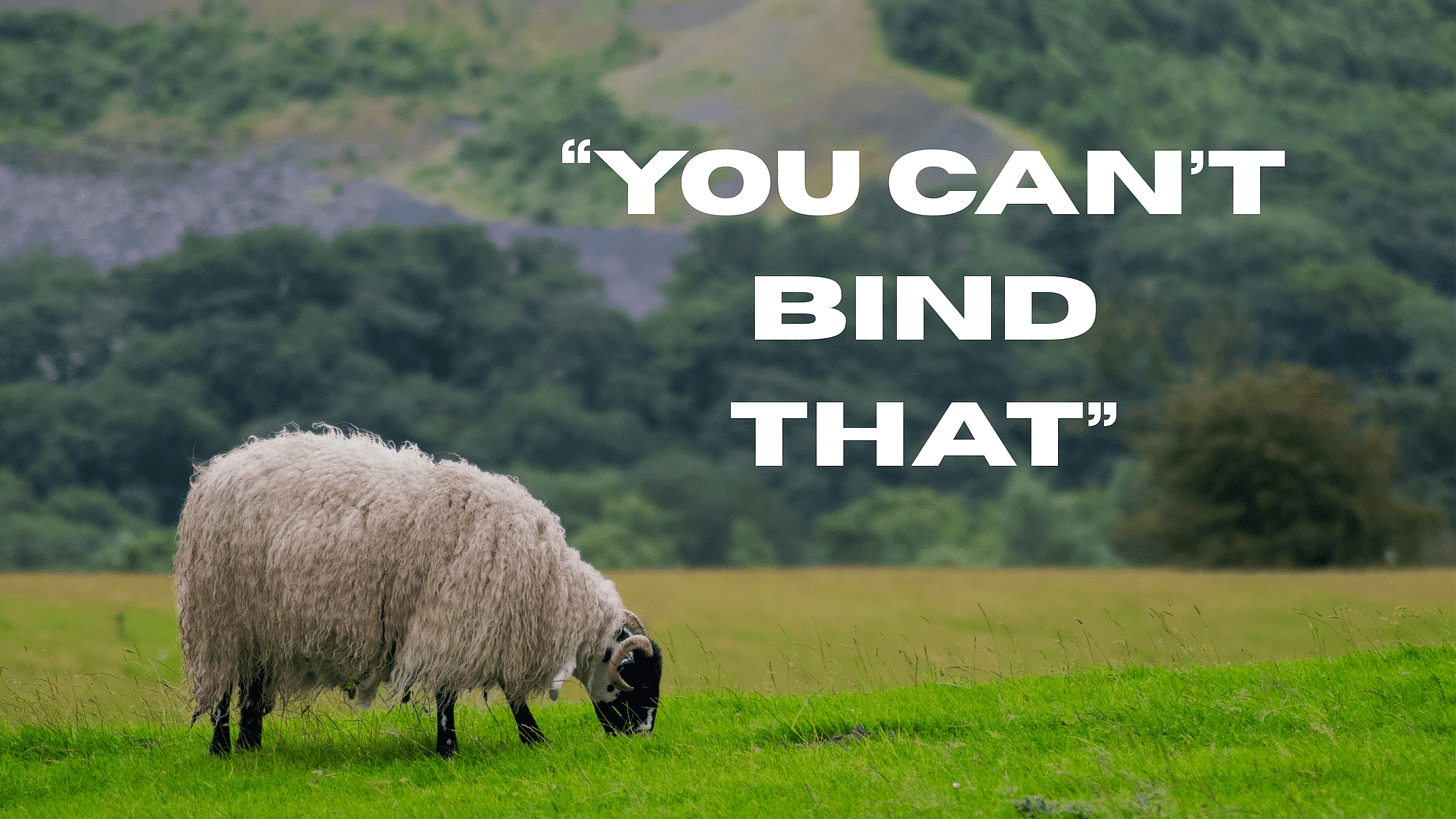"You Can't Bind That"
More on Christian culture
In order to create a Christian culture (as discussed in a recent post), it’s going to require a lot of Biblical teaching.
Christ’s Lordship over all of life and His instructions that give us “everything pertaining to life and godliness” (2 Peter 1:3) won’t leave any part of our lives untouched.
I keep citing the epistles to Timothy and Titus in these articles, but I do so for a reason—God’s church has a “house law” (1 Timothy 3:15) and its leaders are to teach people what it is and how to follow it.
This looks a lot like shepherding for the safety and wellness of the congregation, which we’ll explain in 3 levels.
1. Every church should have plainly stated requirements for membership.
2. Every church should have plain teaching on what is and what is not a sin.
3. Every church should have plain teaching on what they recommend as normative, healthy practices.
It’s akin to a shepherd installing a gate (requirements for membership) and a fence (bounds of accepted behavior) and then leading his sheep to certain areas within those bounds (things encouraged but not required).*
*I’ve never been a shepherd so let’s not get too technical in analyzing the analogy. You get the idea.
To some this seems to wildly overstep the church’s role. What would they suggest instead? Take a look at the options that are out there.
Some think we should essentially stand for nothing. Everybody is welcome, no questions asked. But rare is the church that has no gate and no fences at all. These types are out there, but thankfully there aren’t many.
More common is the “Be a good person” brand of church. They’ll hold loosely to a few doctrines on church organization or salvation but beyond that they aren’t going to meddle in your life or call you to confess any particular truths. As the late Dr. Voddie Baucham has said, “We follow the 11th commandment, ‘Thou shalt be nice,’ and we don’t believe the other 10.”
Third, and perhaps most common, is the kind of church who will set up the gate and the fence and then leave it entirely up to the individual sheep as to what they do inside those bounds.
There is only right and wrong and no good, better, best. “You can’t bind that” rules the day on any matter of discernment, wisdom, or maturity (Hebrews 5:14), so we’re only going to address a behavior or belief if it’s a clear-cut sin issue.
Most are ok with this third arrangement. For those to whom even that goes too far, they can go with the second arrangement. Anything more is too much.
So, for example: a church can say you need to be baptized to be a member (gate). They can say you can’t commit adultery or rob a bank, refuse to repent, and continue on as a member (fence). But they can’t say they encourage young people to seek marriage and childbearing (grass preference), because “YOU CAN’T BIND THAT.”
You’ll even hear people say things like “God doesn’t care about what I do regarding x, y, or z ” or “God’s not going to send somebody to hell for [fill in the blank].”
The church is only allowed a gate and a (low, widely posted) fence. The shepherds can enforce those, but as long as people are inside the fence, the shepherds aren’t allowed to make any suggestions.
But do you know where else we see gate, fence, and grass shepherding? In literally every other authority structure.
The household practices it through identity gained by marriage, birth, and/or adoption (gate), household rules (fences), and encouraged behaviors (grass preference). I want my daughter to eat all of her green beans (preference). I insist she can’t leave the table unless she eats 4 bites (fence). When she asks why her cousin doesn’t have to eat 4 bites, I remind her that I’m her father and not his (gate). Simple as that.
The government practices it through citizenship requirements (gate), laws (fences), and encouragement and subsidization of preferred beliefs and behaviors (grass preference). They aren’t going to force you to support LGBT rights, but they’ll use your tax dollars to light up the White House in rainbow colors and host pride parades to signal that such is the stance that gains their favor.
Your workplace practices it through employment (gate), codes of conduct (fences), and encouraged behaviors (grass preference). You might not get censured or fired for leaving a messy desk or forgetting to fuel up the truck each Friday… but they’d highly prefer it if you do.
I go through these illustrations to prove that this three-layered system of leadership is something we accept as perfectly normal everywhere except the church. No, the church has to pretend all grass is created equal (and maybe even lower the fences) because otherwise somebody’s feelings might get hurt, or they might be uncomfortable hearing that their preacher and elders would encourage them to live differently than they currently are.
This tradeoff has a tremendous cost.
It damages our unity greatly.
We aren’t on the same team in anything except the gate and the fences, so we don’t make much of a flock. We’re people who share a Sunday morning appointment.
Additionally, it reduces us to mere law-keepers.
And guess what—if we want to be saved by law-keeping, saying “Give me the list and don’t ask anything else of me,” we’re going to be judged by law. That’s not going to go well (Galatians 5:4). That’s the irony of all of this—those who oppose any teaching that isn’t a “Thou shalt” will accuse us of legalism. But who’s more legalistic than the person who says “I’m only doing something if God says I have to”?
But perhaps more importantly, it robs the sheep of joy.
The gate is justification. Once you’re inside the gate, you’re saved, justified from your sins by the blood of Christ.
The fence is the baseline of sanctification. But sanctification is not merely the avoidance of the “thou shalt nots.” It’s also growth toward maturity, and nobody ever achieved maturity by doing the bare minimum and saying “leave me alone, you can’t bind anything else on me.”
Maturity is developing discernment about holy living (Hebrews 5:14), “striving to learn what is pleasing to the Lord” (Ephesians 5:10). It’s realizing that sometimes there is a “good, better, best” structure to our actions, and then wanting to pursue the “best” with all our hearts.
The more we strive for the best, the more we orient our lives toward the things of God, the more we diligently seek Him (Hebrews 11:6), the more joyful we’ll be. Those who refuse to accept shepherding and preaching that orients us toward the “best” because we’re already saved and that’s good enough only rob themselves.
And churches who strive to keep everybody happy by refusing to prescribe Biblical principles do so at the cost of greater individual joy and greater community holiness.
It’s a rotten tradeoff, and it’s time we start demanding better grass to graze on.
Notes
You Are Saved book previews for the Intro, Chapter 1, and Chapter 2 are now up! Start here if you want to follow along.
This week’s Think Deeper Podcast goes into practical ways Christians can stand up for what’s right, in the church, in your marriage and parenting, in your friendships, in your evangelism, and more. Go here to listen and/or subscribe!
As always, subscribing is free. Just put in your email to get my latest work as it goes up
If you’d like to support my work, select a paid option at the link below. Thanks!




LOVE THIS!
Great analogies Jack. My church is a theology-free zone. We have full Pretorists and Dispensationalists and everything between. But if you commit to serving, you are good to go. God is love don’t you know. Get on the love train. That’s your ticket to heaven. I am but a lone voice in the wilderness. Repent I cry!